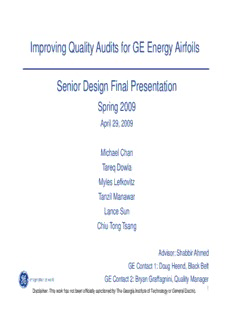
GE Energy (Airfoils) - w.smartech.gatech.edu 3. - Georgia Institute of PDF
Preview GE Energy (Airfoils) - w.smartech.gatech.edu 3. - Georgia Institute of
Improving Quality Audits for GE Energy Airfoils Senior Design Final Presentation Spring 2009 April 29, 2009 Michael Chan Tareq Dowla Myles Lefkovitz Tanzil Manawar Lance Sun Chiu Tong Tsang Advisor: Shabbir Ahmed GE Contact 1: Doug Heend, Black Belt GE Contact 2: Bryan Graffagnini, Quality Manager 1 Disclaimer: This work has not been officially sanctioned by The Georgia Institute of Technology or General Electric. Background GE Energy Airfoils produces airfoils for use in turbines. The plant is located in Duluth, GA. (cid:131) 4600 airfoils/week (cid:131) 1/1000th inch tolerance (cid:131) ~16 types per turbine (cid:131) Shape and texture consistency 2 Manufacturing Layout Rootmill& Forge Airfoil Shot Drag Lug Polish Testing Tip Cut Inspection Release Milling Peen Finish Milling CMM CMM Coordinate Measuring Forges Machine (CMM) 3 Problems • Dashboard system Lack of manager • Detect trends and variation visibility early Excessive • Correlation study inspection time • Eliminate redundant checkpoints Inaccurate • Linear regression In-process • Prevent loss of resources tolerance levels Potential Savings: $830,000 4 Problem 1: Lack of quality visibility in the process There is poor visibility when determining if there are airfoils out of specification. Unable to identify machine shift Lack of Consecutive Quality Defects Visibility Unable to identify high variation processes In 2008, this lack of visibility resulted in $200,000 in defect costs. 5 Problem 1: Methodology Updating tools in Microsoft Access to increase visibility and improve quality • Automatically aggregate CMM data • Detect out-of-control processes (using z-scores) • Visualize via control charts 6 Problem 1: Control Charts - X-bar and Range Out of Control 7 Problem 2: Excessive Inspection Time ~25 minutes on average to CMM an airfoil (cid:131) 3000 airfoils/week measured (cid:131) 1250 hours/week of CMM time (cid:131) Shortage cost of airfoils: $150,000/year (cid:131) Cost of CMM machine: $150,000 8 Problem 2: Methodology • Reduce cycle time by reducing number of sections inspected • Correlation between sections implies redundancy • Remove redundant sections without losing too much detection power 9 Problem 2: Methodology • Linear model estimates measurements of removed sections from those of retained sections • Loss of detection power (Index) is calculated from the linear model as a function of retained sections • Find optimal set of retained sections to minimize Index Retained Sections All Linear Index Sections Estimation Removed Sections 10
Description: